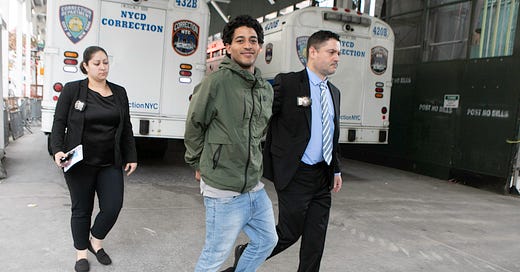
At 2 a.m. on November 17, a 38-year-old resident of Hell’s Kitchen, near Times Square, was just getting home when a man followed her through her front door. After he demanded cash and motioned that he might have a gun in his pocket, she tossed him her phone, ID, and debit card. Before fleeing, he masturbated for “several moments,” according to prosecutors, while the woman stood terrified, cowering in the corner of her stairwell.
While stories like this have become commonplace in New York City as of late, this thief was no ordinary criminal. He is 25-year-old Brandon Simosa, a Venezuelan migrant with links to the violent cartel Tren de Aragua, which is disrupting cities across America. And the woman he robbed was no ordinary victim. She is a New York City prosecutor who works to put guys like Simosa behind bars.
But the victim, who has not been named, works for Alvin Bragg, the Manhattan district attorney who has downgraded 60 percent of felony cases to lesser charges, while declining to prosecute 14 percent of all arrests last year. In progressive circles across America, Bragg is celebrated as the “anointed one,” in the words of MSNBC’s Lawrence O’Donnell, for convicting Donald Trump on 34 counts of falsifying business records. But to many in New York, he’s better known for his track record of freeing criminals like Ramon Rivera, a homeless man who had two decades of arrests on his rap sheet, plus time in prison and two stints at a psychiatric hospital, when he recently stabbed three New Yorkers to death. Prostitution, resisting arrest, and jumping the turnstile all get a pass under Bragg, who instructed his office not to prosecute those charges in his infamous “Day One” memo from when he first took office on January 3, 2022.


